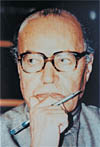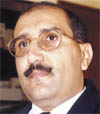German Ambassador to Yemen, Mr. Werner Zimprich to YT: “Yemen has been chosen by our government to stand as pilot country among the 70 developing countries that Germany is cooperating with.” [Archives:2002/40/Interview]
In the 12 years since German unification political, economic and social life in the new eastern Lander (states) has changed fundamentally. Enormous progress has been made in ‘Aufbau Ost’, the recovery program for eastern Germany. At the same time there are still clear shortcomings in many sectors. The goal of establishing comparable living standards between eastern and western Germany has not yet been achieved. The greatest successes include the fundamental renewal of the eastern infrastructure, rehabilitation of the environment and the rescue of historical city centers. The building up of a new eastern German economy has made great progress, although the aim of a self-supporting upswing has not yet been attained. The most painful gap between eastern and western Germany is still the high unemployment in the new states, which is twice as great as that in the old ones.
The friendly relations between the Republic of Yemen and the Federal Republic of Germany are very distinguished and growing steadily. We consider the Day of the German Unity as a very special and joyful occasion for the friendly people of Germany and an historic event in their modern history. Yemen Times has seized this happy occasion to conduct an interview with His Excellency the Ambassador of the Federal Republic of Germany to Yemen Mr. Werner Zimprich.
Following is text of the interview conducted by Mr Mohammed Khidhr from the Yemen Times with HE the German Ambassador who has answered some questions related to the occasion and the Yemeni-German relations.
Q: How do you assess the 12 years of German unity, politically, economically, and socially?
A: The political ‘turning-point’ or what we call in German ‘Die Wende’ and the following unification belong to the most impressive events of the last century. The partition of our country could be overcome by peaceful means and with the consent of all our neighbor countries.
The political unity was quickly achieved. But it took a long time to accomplish the ‘internal unity’, i.e. that the Germans grew together to one national community in human, social and economic terms. The income and living conditions got adjusted to West German standards, not entirely but almost.
Q: Both German and Yemeni unities have been achieved in the same year, could you hold a comparison of the two historic events?
A: The experiences made by the Federal Republic of Germany and the Republic of Yemen who both achieved their unity in 1990, were different. In Germany, the (former) German Democratic Republic joined the Federal Republic of Germany. In Yemen a merge that was settled by a treaty, led to a new state with a new name, a new flag and a new constitution. In addition to that, Yemen struggled with much more internal difficulties because of the civil war in 1994.
Q: What are your country’s most recent aspects of cooperation with Yemen, any future cooperation plans?
A: Yemen-German cooperation has been outstanding in many fields. Since the establishment of diplomatic relations between the two countries a continuous political dialogue has taken place. Numerous cultural activities have complemented the political intercourse. The Federal Republic of Germany is looking forward to continue the dialogue in order to further deepen the mutual understanding, trust and friendship between our two countries.
The Yemeni-German relationship is marked by its friendly cooperation in economic development. Last year, Yemen has been chosen by our government to stand as pilot country among the 70 developing countries that Germany is cooperating with.
This year, official bilateral development cooperation has been boosted by a significant increase of our annual contributions. Allocations in 2001 amounted to almost 25 Million US-Dollars. In 2002 we expect them to be around 37.5 Million US-Dollars.
We are cooperating in four sectors: health, water supply, basic education and promotion of economic development including vocational training. About 75% of our financial contributions are used for infrastructure in the water sector. Right now, we are planning for the water supply and sanitation among others in the towns of Saadah, Jiblah, ja’ar, Al-Shahr and Jinjibar. Recently we have also extended our program of advisory services to the governorates of Marib and Al-Jawf in order to contribute to the improvement of social services in the health sector and the education sector.
We are most willing to continue our cooperation within the framework of the Yemeni National Poverty Reduction Strategy that has been endorsed by the Yemeni government in summer 2002. The German government has pledged to contribute to alleviating poverty in Yemen during the next decade. We will renew our commitment on the occasion of the meeting of the Consultative Group in October 2002 when all interested donors will be meeting at the World Bank Office in Paris to discuss the future development of Yemen.
Q: Germany, in person of Chancellor Gerhard Schroeder, has stated a distinguished German stand concerning the US plan for a military action against Iraq with intention to change the regime. Why do you think he took this stance?
A: The United Nations demanded that the regime in Baghdad has to fulfill the UN-resolution without exception. That means above all, that the weapon inspectors must get the permission to enter the country again. But the question is whether, instead of this aim, another one inducing the change of the regime should be focused in the discussion. Wouldn’t this interfere with the exclusive decisive power of the security council?
Q: Now following the winning of a second term as Chancellor would he retain this stance, and would he try to attract other European countries to follow suit?
A: There is a constant and intensive interchange of views about all the important questions with the European partners. Already two days after the chancellor won the elections, he met the British prime minister.
Beside that, it is natural that the German government is at its utmost to obtain good relations with the USA which are particularly important for our country.
Q: Any word on the 40th anniversary of the Yemeni 26 September Revolution or other issues?
A: The Yemeni 26 September revolution represented at the time a major step into the prospering future of the Republic of Yemen. The efforts in developing the country and its legal democratic system since then were impressive.
The Federal Republic of Germany presents its congratulations on the occasion of this anniversary celebration and will support the Republic of Yemen in the development process by all possible means in the future.
——
[archive-e:40-v:2002-y:2002-d:2002-09-30-p:./2002/iss40/intrview.htm]


